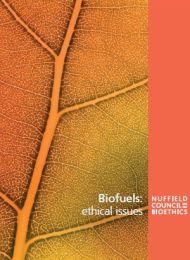Biofuels: ethical issues
Report
Published 12/04/2011

This guide summaries the main themes and recommendations that are discussed in the Nuffield Council on Bioethics’ report Biofuels: ethical issues, published April 2011.
Fuel for transport makes up almost a third of the current world energy consumption. Biofuels – renewable liquid or gaseous transport fuels derived from plant or animal material – have emerged as one of a number of possible alternatives to fossil fuels that might help meet our energy needs in an environmentally sustainable way.
However, biofuels production, which mainly uses food crops, has been controversial because in some cases it has led to deforestation, and to disputes over rising food prices and land use. New types of biofuels, such as those using non-food crops and algae, are being developed with the aim of meeting our energy demands whilst avoiding the problems of the past.
At the moment, biofuels make up only a small proportion of world energy use, but this is expected to increase, due in part to targets and policies that are encouraging uptake of biofuels for transport. It has been estimated that biofuels will provide almost 9 per cent of transport fuel in Europe by 2020.

Share